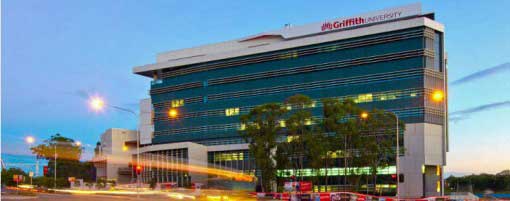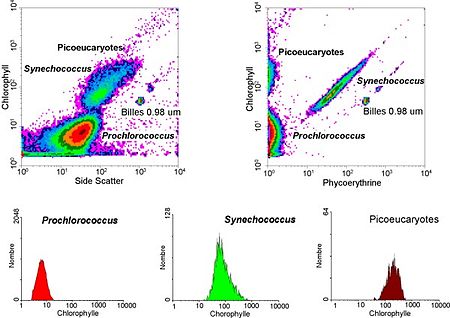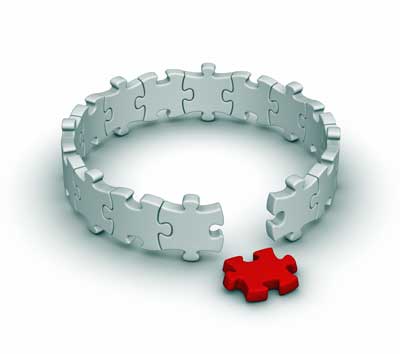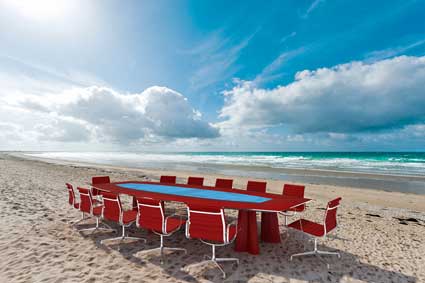


Lead by Dr. Sonya Marshall-Gradisnik, the new center focuses on a key area in chronic fatigue syndrome, the neuro-immune system. They’re officially opening their doors tomorrow.
NCNED’s Big New Toy
“The NCNED heralds a higher level in Griffith’s capacity for state-of-the-art neuro-immunological research in the context of nervous system disorders” Dr. Marshall-Gradisnik
The move is not just an upgrade for NCNED, which gets a top-notch lab and an ME/CFS clinic opening in February, 2014, but for the University as well.
The NCNED scored a big win for both when they found funding for a flow cytometer. NCNED is only the second group in all of Australia to have this type of cytometer (an LSR Fortessa X20 Flow Cytometer). Flow cyotometers are able to analyze thousands of particle in the blood or spinal fluid, pick out a cell and then determine what’s in it.
They’re adept at many different functions including immunophenotyping, gene and chromosome analysis, detecting protein modifications, identifying antigens, and measuring a variety of parameters including cytokines, enzymatic activity, intracellular pH, membrane fluidity, apoptosis (mitochondrial membrane potential), oxidative burst, glutathione and more.
The NCNED’s purchase of the flow cytometer means they’ll be able to dig much deeper into their ME/CFS samples. The new cytometer will quickly be put to use analyzing the precious spinal cord fluid samples gathered from Dr. Peterson at Simmaron Research. (Simmaron and the NCNED’s testing to ensure the spinal fluid samples survived the long trip from Nevada to Australia in good shape is a story in itself. Simmaron was so impressed by the NCNED’s expertise that they flew some patients down to Australia earlier this year to get their blood drawn and tested in their labs. )
The Clinic
“We now have the capacity, not only for advanced research but also the potential to provide a clinical service to people who have been unable to find appropriate care in the past ….These disorders are a major cause of neurological disability in Australia.”Dr. Marshall-Gradisnik.
An ME/CFS Clinic opening in Feb, 2014 that will translate the NCNED’s immune findings into treatment opportunities will provide a much needed new option for treatment in Australia.
Biomarker Study Underway
Last year Dr. Marshall-Gradisnik sounded hopeful when she said
“Ultimately our aim is to develop a clear diagnostic test for CFS … which we believe could happen within the next five years.”Dr. Marshall-Gradisnik
In an interview I did with her last year, Dr. Marshall-Gradisnik said she was ‘quietly confident’ about finding a biomarker She also said she felt that the first biomarker for ME/CFS will not be something we’ve heard of before.
Step forward just one year and it appears Dr. Marshall-Gradisnik’s ‘quiet confidence’ was not misplaced; the NCNED is holding a study to look for immune biomarkers. Let’s cross our fingers that they’ve found something, and, if you can, please participate in this study.
Call (07)56789283 or email ncned@griffith.edu.au for more information and to make an appointment.
Several blood collection sites are available in the Gold Coast and Brisbane area:
- Robina Hospital,
- NCNED Center (Griffith Univeristy on Parkland Drive)
- Logan Hospital
- Royal Women Brisbane hospital
- Tweed Hospital
Research
“Our research is leading the way internationally to uncover the causes of this illness and the search for effective treatments based on our unique immunological discoveries.”
‘Unique immunological discoveries’, indeed. A quick look at the NCNED’s recent publications reveals an intense focus on the immune system. From the effects of vaccination on the immune system, to the relationship between heat shock proteins and regulatory T-cells, to microRNA’s effects on NK and T cells, the NCNED is staking out new ground in chronic fatigue syndrome.
Thus far this past year NCNED researchers have presented their findings at the International Congress of Immunology, the International Mental Health Instrument, the Asian Congress of Autoimmunity and the Invest in ME International ME Conference. The topics they’ve spoken on include NK cells, neutrophils, dendritic cells and monocytes, B-lymphocytes and immunological biomarkers.
The NCNED’s Second International Symposium on ME/CFS
The NCNED’s second International Symposium on ME/CFS marks the opening of the facility.
Dr. Unger of the CDC will help Dr. Marshall-Gradisnuk open the day long symposium. The talks feature some intriguing and new slants on ME/CFS. The first proposes that cortistatin neuropeptides play a key role in the progress of inflammatory and autoimmune disorders. Produced by the CORT gene (!) cortostatin and its receptors are viewed as potential drug targets in inflammatory disorders.
Dr. Staines vasoactive intestinal peptide theory hits some key spots in ME/CFS (vasoactive – blood vessels, intestinal – gut), but for the first time it’s ‘therapeutic applications’ are the focus of a talk.
Tryptophan metabolism, another subject we don’t hear a lot about, but presents intriguing possibilities for both fibromyalgia and ME/CFS, headlines another talk. Differentiating ME/CFS from anxiety and depression using neuroimaging, and several immune focused talks from NCNED members make up the rest of the first research focused session.
Dr. Daniel Peterson has strong connections to NCNED and he leads off the next session with a talk on ‘New horizons for ME/CFS”. His talk is followed by talks on long term outcomes for young people with ME/CFS, clinical management and others.
Conclusion
With a big grant they scored earlier this year, their new lab, their clinic opening up soon and their big, new toy, the NCNED appears to be in good shape to make a difference in ME/CFS. Things are indeed looking up down under.
- Please check out their Facebook Site and ‘Like it’









Sounds like wow!
Sounds great- I’ll wait for them to get off the ground and get the bugs out. This all sounds so
PLAUSABLE. I can definitely tell as I get older there are more Neuro problems. Is testing going to be going on here anytime soon? I don’t understand why the Neurologists in the US have not picked up on this??????
Thanks again Cort for being on top of everything.
Carole
I’m sorry I feel like I’m in a time warp here. They were invented in the 50’s. In the US probably every large commercial lab, certainly every Medical School, any research facility- both Tufts Medical School and Woods Hole in Massachusetts, in 1986 ,when I was there had flow cytometers! Any work that’s done with HIV that looks at CD4 cells for instance is done with a flow cytometer. Much of cancer research is done with one. Heck there’s one out at the research lab at Bodega Bay for Oceanography research.
I would bet you that there were several in use at Ian Lipkins lab alone!
The idea of flying one from Incline Village to Australia for a flow cytometer makes me question the sanity of the research and researcher!
Gregory G. Cutler DVM
Yes, there were invented in the 1950’s. Your response makes me think that report which stated there are only two in Australia must be wrong – so I removed it!
I doubt that the patients were sent to Australia to use a flow cytometry machine that wasn’t funded or present yet, however. That was long before the machine was purchased. Dr. Peterson uses labs across the US including Dr. Klimas lab, but PHANU obviously had something in their lab which was different. They may have also, as they did with the spinal fluid, been assessing how effective it was to ship blood all the way to Australia. Perhaps they had some patients give blood in Australia and the US, and then shipped their US blood to the Australia and compared the results from the two. NCNED is doing work in ME/CFS that no one else is doing such as examining cytotoxic T-cell effectiveness.
The modern machines are obviously much more capable than the earlier ones. 🙂
Modern instruments usually have multiple lasers and fluorescence detectors. The current record for a commercial instrument is ten lasers[6] and 18 fluorescence detectors. Increasing the number of lasers and detectors allows for multiple antibody labeling, and can more precisely identify a target population by their phenotypic markers. Certain instruments can even take digital images of individual cells, allowing for the analysis of fluorescent signal location within or on the surface of cells.
http://en.wikipedia.org/wiki/Flow_cytometry
From NCNED’s Facebook page photos- https://www.facebook.com/photo.php?fbid=337042719761532&set=pb.301252900007181.-2207520000.1385966377.&type=3&src=https%3A%2F%2Fscontent-b-dfw.xx.fbcdn.net%2Fhphotos-prn1%2F66731_337042719761532_2019086355_n.png&size=640%2C960
National Centre for Neuroimmunology and Emerging Diseases – NCNED
EXCITING day today!
Today we received our brand new flow cytometer. This is the new LSR Fortessa X20 Flow Cytometer.
Here at NCNED we are the FIRST in Queensland to have this and the SECOND in all of Australia/New Zealand.
We can’t wait to start our research using this!
Kind regards, NCNED.
https://www.facebook.com/photo.php?fbid=350714188394385&set=pb.301252900007181.-2207520000.1385966371.&type=3&src=https%3A%2F%2Ffbcdn-sphotos-h-a.akamaihd.net%2Fhphotos-ak-prn2%2F1269746_350714188394385_1153800529_o.jpg&smallsrc=https%3A%2F%2Fscontent-b-dfw.xx.fbcdn.net%2Fhphotos-prn1%2F1236415_350714188394385_1153800529_n.jpg&size=2048%2C1529
This type of cytometer:). That cleared up that issue – thanks, John.
Cort, could you please clarify for me a sentence in the “Biomarker Study Underway” section? The sentence relates to Dr. Marshall-Gradisnuk’s being “quietly confident’ about finding a unique biomarker. I’m confused about her saying “she felt that the first biomarker for ME/CFS will be unique; i.e. something we’ve heard of before.” Is it perhaps something we’ve “not” heard of before? (Or is it my fog tonight?? 😀 )
Nope it was me – I missed a word.
I asked her if we had a biomarker that just needed to be validated. She thought not – she thought the biomarker still hadn’t been discovered. It should have said “something we’ve never heard of before.
This sentence makes no sense:
She also said she felt that the first biomarker for ME/CFS will be unique; i.e. something we’ve heard of before.
Wouldn’t something unique be something we’ve ‘not’ heard of before?
See answer to the above comment. It was just changed.
Superb center! – As for the symposium, opening and closing address by Dr. Unger of the CDC… How should we feel about that?
My guess is that having the CDC chief open and close the symposium is probably seen as a validation of their Center given the CDC’s reputation in the world. I haven’t heard that they’re collaborating in any way.
Personally, I like what Dr. Unger is doing and the fact that she’s taken the CDC in a very different direction than Dr. Reeves. They’re very conservative – I don’t know if we can hope for big breakthroughs from them;but in general I like the changes..
It’s also a long way to Australia – probably hard to get people down there 🙂
A new center is opened and the speculation began. Why all the ‘paranoia’? Why people think that something special has been found? Nothing has been found yet. Nothing will be found ever because CFS is not one disease. Sorry, i am not so optimistic. I think we will never know what causes our problems. Maybe about one hundred years they know…. let me be wrong! But i am ‘happy’ a new center will be opened.
The doubter! 🙂 That’s certainly justified given our history and the slow pace of research
Check this out, though. I was going to include this in the blog, but I didn’t. Every time Dr. Marshall-Gradisnuk talks about the cause of ME/CFS she talks about causes.. Look at all the plurals below.
When I asked her about a biomarker – she said “Probably not. It will be important to truly understand the pathomechanisms of ME/CFS before anyone can be 100% confident in a biomarker.”
Later she said “CFS/ME patients may not be ideally applied for a blanket method intervention, however, due to the number of CFS/ME sub groups.”
and then recently she said
“Our research is leading the way internationally to uncover the causes of this illness and the search for effective treatments based on our unique immunological discoveries.”
She very much recognizes the subsets. If a biomarker is found it will be for one subset (hopefully mine, for sure and hopefully, a broad one.)
I admire you optimism and positivity Cort. I’m more of a critical rationalist. I do not believe in hope but in objective data…. 🙂
I do specialize in optimism 🙂
I hope we get some good objective data that curls your toes.
Great blog, Cort.
I was thinking that the fact that Dr. Peterson disassociated himself from the Whitmore Peterson Institute which was basically in his backyard and then created an close association with this facility in Australia which is halfway across the globe sure says a lot.
Then to think of it, Dr. Kenny De Merleir comes all the way from Europe to set up a practice at the Whitmore Peterson Institute.
Speaking of traveling, it’s pretty impressive to see what you do while in “camping” mode.
Lots of movement going on. I hope they all work out – the WPI and NCNED and NovaSoutheastern and Stanford, etc. really well. We need all the resources we can get.
Hi I have been following this blog for a while now and always find the data interesting – some days it makes sense and other days well, I have to come back and read it again – bloody brain fog. I am in Australia and live about 3 hours drive north of Brisbane and Griffith University. I have fibromyalgia, ME (or we call it CFS here) and Ross River virus (caused by mosquito) and Menier’s Disease (inner ear). I, for one, am very interested that one of our Universities is getting involved regardless of politics, medical infighting, who’s who or who got the money etc. Australia has some of the best research facilities and research people but are sadly lacking funding – particularly those who wish to remain free or independent from drug companies – and so often our research goes overseas – so this is a BIG WOW! and so close to Me!!
If I am well enough, and even if I am not -I think I will drag myself along to be part of the research because – as with most of us who suffer this bewildering and frustrating illness – I have spent many hours lying in bed thinking thinking thinking and trying to work out where it all started for me. The old chicken/egg theory of which came first – fibromalgia or CFS – I have my own ideas about this! and of course, there are still those medical professionals who think it is all in your head!
Fortunately, my local doctor (in a small town of only 1000 people) does not think I am nuts or a hypochondriac and we also have a government that believes CFS is real which allows me to receive a disability pension payment – so I am “lucky” in that respect.
Often in Australia we feel disenfranchised and out of the loop and as most research is from overseas so we feel forgotten and disconnected…Bring on more research facilities that involve those who are afflicted right here ! Keep up the good work with the spread of information and knowledge too. Thank you
Cort, this is fantastic news for us Aussies coping with little pro-active medical help until now. One small thing, the centre’s leader’s name is Dr. Sonya Marshall-Gradisnik, not Gradisnuk.
Thanks, Lynne
Hi Cort, when discussing the research done by this team, you mentioned research involving the effect vaccination has on the immune system. A great many teenage girls are currently developing ME, CFS, autoimmune and autonomic problems after the HPV vaccine, my daughter being one such girl. Do you have links to that research mention in your post? Thanks, and a great and informative post as ever:)
As n 81yr old, where the aging curve has crossed the improving fatigue curve,, Iam passionately interested still in this subject.
In ’95 I was in contact with an infectious disease brought back from HongKong And/or Aussie by my son…He had incapacitating vertigo, anorexia, that made him cut short his trip and come home, where he ran a temp of 42,5°C for a couple of days, coming down to about normal over a week when, basically a healthy guy, he went back to his girlfriend.
Over the next weeks I had all the symptoms except temperature, repeating after partial recovery three times….and then I was never well againfor 5-6 years. Double vision, I couldn’t eat, I fell off my skis when I tried, and above all, after walking 100m, symptoms were exacerbated and I was in bed for 2-3 weeks., couldn’t read, converse , listen etc
Obviously GP’s guessed a pychological basis linked to my son…and turned the page. My husband, luckily himself a doctor, bears witness to his helplessnes and worry. Over the years symptoms diminished, replaced by diverticulitis, surgery in 2007 and now I am a fairly ordinary 81yrold, used to managing my activity..and know I am lucky. Bu will never know just what happened. So I sympathise with all my frustrated co-sufferers
As a local about an hour’s drive from the unit, I am over the moon about it. Australia hasn’t had an ME dedicated unit looking purely into the biology of the illness before. Or dedicated hospital beds. We’ve only had isolated doctors or researchers who have come and gone and the usual small number of psychiatrically leaning nuisances that every country seems to suffer from.
I understand that Sonia Marshall-Gradisnik now has 10 researchers working under her and they have 13 publications so far from about 4 years work. They have won 2 large grants from the Queensland Health Department for their work (Queensland being a state of Australia), one large grant from a private trust and have ongoing support from the Alison Hunter Foundation. She and Don Staines seem to have brought about a sea change in attitude towards the illness here with specialists, high level academics and health department managers all apparently coming on board to help. The Health Department grants are particularly unusual and significant.
Neither Sonya nor Don have any personal connection with the illness – both have come to us from individual experiences which showed to them that the patients were being very poorly served (or not being at all served) by the system. To any fellow Australians on this site, I think we owe these researchers our maximum support (and that particularly includes monetary donations through the Hunter Foundation).
Will something significant come out of this? I don’t know and no one can be sure. But this is the most determined effort we’ve had in this country, from people who could have chosen to look the other way but didn’t. If we don’t take our own illness seriously and make maximal efforts against it, we shouldn’t expect anyone else to.
Thanks for all the info Peter 🙂 They just came out with a great paper comparing immune functioning in CCC vs Fukuda diagnosed patients.
I understand that they are deliberately looking at 2 groups:
(1) The severely affected and
(2) The International Consensus Criteria (ie Canadian) defined group as against the Fukuda defined group.
Their basic hypothesis is that what is going wrong with us is more likely to be apparent in the severely affected than the less ill, and in the more tightly defined ICC group than in the more heterogeneous Fukuda group.
I am particularly blown away by what they are doing with the severely affected. This has been a particularly neglected group due to the fact they have more trouble getting to a hospital or blood collection point. They have been doing home visits to collect blood from these patients, at not doubt considerable cost and inconvenience to themselves.
I’m one of the subjects in the not so severe group. I cannot begin to describe my joy after so many years of patients being third class citizens in the medical system, of seeing these large scale studies being done in a network of hospitals, with the nurses, doctors and blood collection staff simply treating the patients as any they would any other.
I’ve been ill nearly 20 years and was head of the local patient group for 7 years. We have never had anything like this and we owe a huge debt to Sonia and Don and the other workers for putting this together.
This is great news.
I see this group have another paper just published, unfortunately it’s only available by paying.
It investigates natural killer cell activity by subgroups.
The natural killer cells must be involved. Repeated studies implicate them. It just seems that a little piece of the jigsaw puzzle is missing in terms of what is disturbing these cells, and hopefully this group can unlock the mystery.